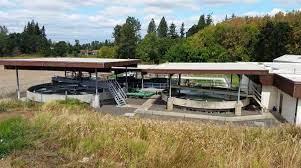Wastewater Treatment Plant Improvements
 Investing in Molalla’s Wastewater Systems
Investing in Molalla’s Wastewater Systems
Sewage from Molalla homes and businesses is treated at the Molalla Wastewater Treatment Plant along the Woodburn-Estacada Highway. Despite efforts to improve operations, the plant has been unable to reliably meet permit requirements. In 2017, the City embarked on a multi-year program to bring the existing wastewater systems into compliance and start preparing for the future. These improvements will require increases in wastewater rates for Molalla homes and businesses.
What improvements are we making?
Planned improvements include (see corresponding photos below):
1. Designing and constructing an expanded wastewater treatment plant
The City is working with DEQ to finalize discharge permit requirements. Once a final permit is received, it will take three years to design and construct the new plant.
2. Repairing old, leaky sewers.
Seven major pipeline projects will be completed between 2019 and 2023. The first project – along Fenton Avenue – was constructed in 2019.These projects are already reducing flows going to treatment plant, which will save the City money on needed improvements at the wastewater treatment plant.
3. Modifying our discharge permit to be consistent with other Oregon communities.
In 2004, Molalla invested in a new pipeline and pump station so the wastewater treatment plant could discharge to the Molalla River instead of Bear Creek. The Molalla River is larger with a much greater capacity to accept treated wastewater – the City’s discharge permit doesn’t currently reflect that. Without these requested permit modifications, the cost of needed upgrades will be much higher without providing significant benefit to the river.

What have we achieved so far?
Molalla has been making steady progress on needed improvements. Work completed is shown below:
A. Bringing our water recycling program into regulatory compliance.
In summer, Molalla’s recycled wastewater is used to irrigate local fields. The water quality of the treated effluent (its “Class”) must be appropriate for the land and crop it’s being used to irrigate and the level of public access. The City renewed its commitment to producing Class C recycled water and only use it for approved Class C uses—irrigation of grass and pasture lands. These improvements have brought the program into compliance with Oregon rules and help protect local streams and rivers.
B. Upgrading our treatment plant.
The City has been making steady improvement at the existing plant. One example is the program to remove built-up solids to help the treatment lagoons work better. The City has committed to DEQ to complete the removal in 5 years, we have completed the work ahead of schedule.
C. Sealing 58 leaking manholes, sealing over 100 cleanouts and repairing 3 stormwater cross connections to keep rainwater out of our sewer system.
Funding Wastewater Improvements
Molalla is working to keep wastewater improvements affordable by requesting permit modifications, managing costs on individual projects, and seeking opportunities for low interest loans and other funding. However, customers’ monthly sewer rates will rise to help support the project. Development fees will also increase to ensure that new development pays its fair share. Much of the improvements will be funded through long-term loans that spread payments over many years, so that future customers share in the cost.
Molalla won’t know the final cost of wastewater improvements until final discharge permit requirements are set and more engineering is complete. Molalla has already been steadily raising sewer rates and has been investing those funds annually in the City’s wastewater systems. Those annual investments will decrease the long-term cost of the major upgrades to come.
Learn More!
The links below connect you to additional information on Molalla’s pathway to regulatory compliance, proposed permit modifications, how we are fixing are leaky sewers, and more.


